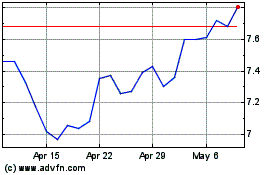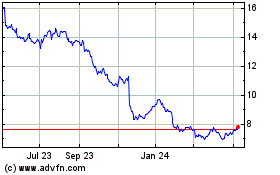Bayer's Board Adds Farming Expert -- WSJ
October 02 2019 - 3:02AM
Dow Jones News
By Ruth Bender
This article is being republished as part of our daily
reproduction of WSJ.com articles that also appeared in the U.S.
print edition of The Wall Street Journal (October 2, 2019).
MONHEIM AM RHEIN, Germany -- Bayer AG Tuesday appointed a
prominent U.S. agriculture expert to its board in the German
chemicals and pharmaceuticals company's latest effort to convince
investors that it has its troubled crop-science business under
control.
Bayer said Ertharin Cousin, a former director of the United
Nations World Food Program, would succeed German manager Thomas
Ebeling on its supervisory board.
Large Bayer shareholders had expressed concern about a lack of
expertise among the company's nonexecutive directors in assessing
the difficulties Bayer has faced since acquiring U.S. agriculture
giant Monsanto Co. last year.
With the acquisition, Bayer inherited thousands of lawsuits
claiming that Monsanto's Roundup herbicide causes cancer. Bayer has
argued that Roundup is safe, but it lost the first three U.S. jury
trials, which sent its share price plummeting and frustrated
shareholders.
As tension rose between shareholders and management, culminating
in a rare no-confidence vote at this year's general meeting,
investors pushed the company to beef up its legal expertise and
bring in more people to oversee an agriculture business that now
accounts for nearly half of group sales.
Ms. Cousin, a lawyer by training, served as the U.S. ambassador
to the U.N. Agencies for Food and Agriculture from 2009 to 2012,
and held several positions in the private sector, such as head of
public affairs at U.S. supermarket chain Albertsons.
Bayer Chairman Werner Wenning said Ms. Cousin's "expertise and
international experience at the interface between government,
business, academia and civil society" would give Bayer new
perspective.
Under Germany's dual-board structure, nonexecutive directors who
represent shareholders and employees act as a controlling instance
on management. And with their trust in the company's leaders
severely dented, shareholders have pushed to tighten their
control.
In June, Bayer responded by creating a special committee of the
board with responsibility for the Roundup lawsuits. The company
also hired a lawyer to advise directors on the proceedings.
While they welcomed the efforts, analysts said nothing short of
resolving the Roundup lawsuits would suffice to lift the
uncertainty that is still clouding the group's prospects and
weighing on its stock.
In recent months, Bayer has hinted that it was growing more open
to settling with plaintiffs, prompting a limited rally in its
shares. But it also continues to fight cases in court and is
appealing all three verdicts against it.
"The point for us is to have finality," Liam Condon, head of
Bayer's crop-science unit, told The Wall Street Journal at a
Bayer-organized conference on the future of farming. "What doesn't
make any sense is to settle and leave a lot of cases open, because
that doesn't settle anything for anybody."
When pharmaceuticals companies settle damage claims that target
their drugs, they typically withdraw the medicine from sale or add
additional warning labels. Bayer's plan to continue to sell Roundup
even after a settlement is complicating the process.
One of the keys to finding a potential settlement agreement, Mr.
Condon said, was finding a way to prevent future lawsuits over a
product that not only is still being sold but also can't be labeled
as risky since regulators deem it safe. Whether that could be
achieved remained unclear, he said.
Write to Ruth Bender at Ruth.Bender@wsj.com
(END) Dow Jones Newswires
October 02, 2019 02:47 ET (06:47 GMT)
Copyright (c) 2019 Dow Jones & Company, Inc.
Bayer Aktiengesellschaft (PK) (USOTC:BAYRY)
Historical Stock Chart
From Mar 2024 to Apr 2024

Bayer Aktiengesellschaft (PK) (USOTC:BAYRY)
Historical Stock Chart
From Apr 2023 to Apr 2024
